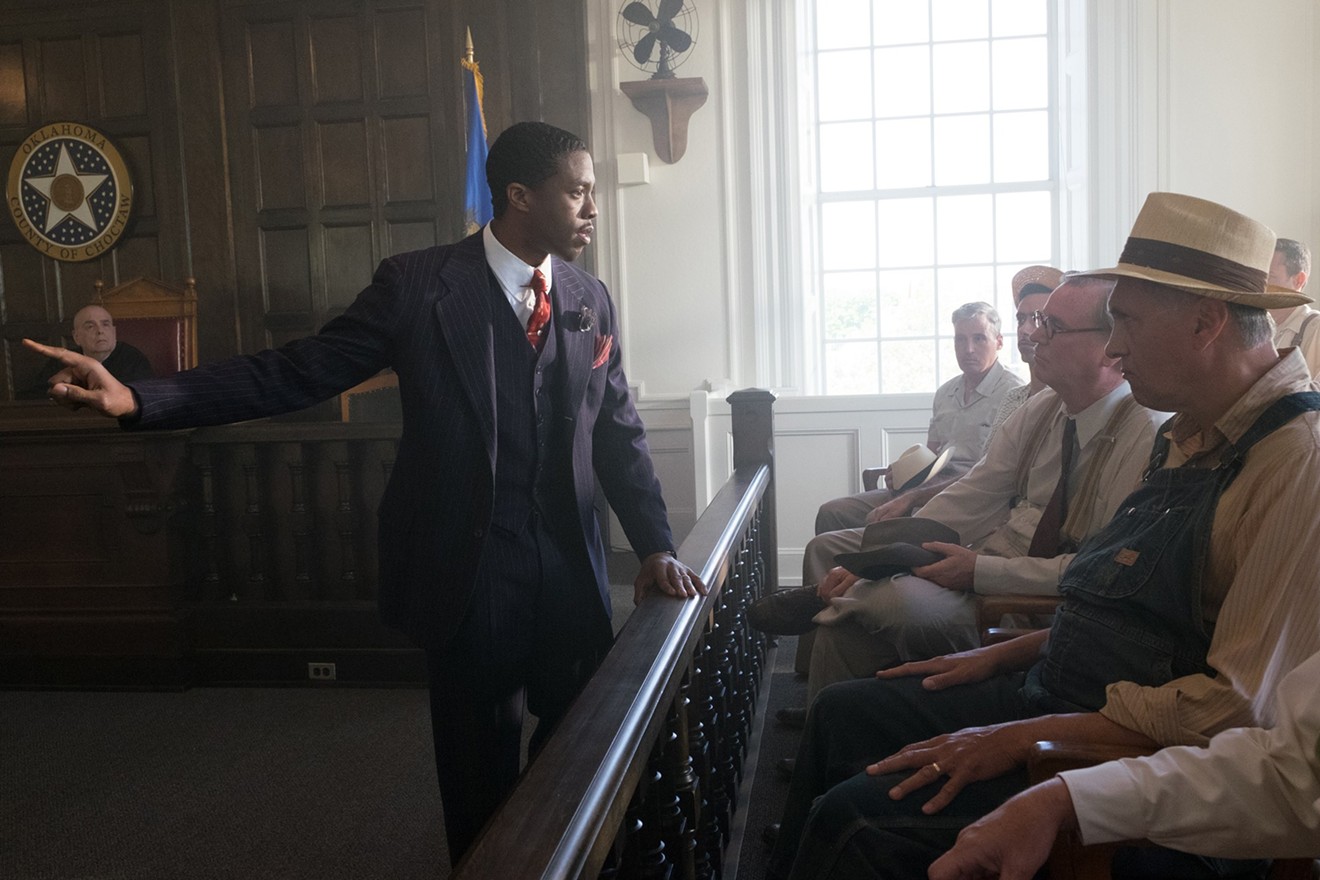America may be crumbling, but here’s at least one truth that might be cheering: They’ve finally figured out biopics. Ever since Walk Hard kicked its ass, that hokiest, flabbiest, most hilariously reductive of movie genres has become, like horror, the rare on3 where the studios allow filmmakers to take risks, even to try out new structures. It’s hard to argue that Lincoln, that compressed drama of vote counting, or Get on Up, that percussive mix-tape on the theme of James Brown, stand as even the same kind of movie as Ray or The Buddy Holly Story. Now to that lineup of proudly cinematic Great Man tales comes Reginald Hudlin’s Marshall, a cheery, candied-up legal thriller and buddy comedy that just happens to star Chadwick Boseman (Jackie, Get on Up) as the first African-American to serve on the U.S. Supreme Court. But don’t expect Marshall to trace the arc of that triumph life, or offer a broad overview of his role in the Civil Rights era, or even mention before the end titles the case Brown v. Board of Education.
Instead, Marshall plays like the tony pilot of a TV law procedural, a show about a crusading lawyer traveling the country on behalf of the NAACP, defending black men charged with crimes they probably didn’t commit. Here he takes on the case of a servant accused of raping a white socialite in Bridgeport, Conn. — and finds himself paired up with a wildly unqualified white co-counsel (Josh Gad) who has to do his talking for him. They could have called it From the Files of Thurgood Marshall, Part One: Social Justice Warrior.
It’s not art, but look at Boseman in those pinstripes, taking a sip from a water fountain labeled “Whites Only,” raining thunder down on white reporters on the courthouse steps about how from now on black Americans would claim all that the constitution purports to promise. Boseman plays Marshall as a performer himself, a man who understands that it takes some theater to shake white folks into recognizing injustice.
In his first scene, to suggest to a courtroom the violence it took to get a confession out of his client, he pounds a cop’s nightstick against a book. The finale finds him dictating a closing argument to the insurance lawyer, Sam Friedman (Gad), that a judge, in a fit of pissy pique, has made his partner. At first the words reel flatly out of Marshall, the facts of the case plus talk of law and scripture, but soon he’s standing, getting louder, moved by the truths behind those words but also the power with which he’s composed them. This gets intercut, sometimes clumsily, with footage of Gad’s Friedman delivering that same argument in court a day later, and then also with some especially clumsy flashbacks to the crime that their client is accused of, but this diminishes neither the words nor Boseman’s performance. The scene is a brief on the urgent necessity of crafting outrage, of communicating it, of making it count. The truth fuels the rhetoric, but it’s the rhetoric that convinces the blinkered to see the truth.
The rest of the film is more conventional, sometimes gripping and sometimes silly, a likable entertainment that never purports to resemble in any convincing way the people and times it depicts. The year is 1940, and the world burnished like a plutocrat’s Rolls-Royce: Everything glows with period-piece falseness, the buttery light of the past, and the cast wears the costumes like they’re showing them off — dig how that looming yokel at the train station hooks his thumbs under his suspenders, or the way the sun slants with high-beams radiance into windows on opposite sides of Friedman’s office at the same time. Corniest of all is a visit to Minton’s in Harlem, where Langston Hughes and Zora Neale Hurston can’t stop saying each other’s names aloud, making sure we’ve got them. I once cattily dismissed Woody Allen’s Midnight in Paris as 90 minutes stuck in one of the murals of authors on the walls of a Barnes & Noble cafe; Hudlin (House Party, The Great White Hype) at least is showman enough to get his caricatures offscreen quickly.
Still, Hudlin keeps things moving, dashing through the setup so quickly that the film only finds its rhythms once the principals stand before the judge. It gets better as it goes, as a legal thriller should. The courtroom scenes prove suspenseful, often twisty and protracted, more Anatomy of a Murder theatrics than John Grisham-style wrangling. Gad gets some anxious laughs in the role of a man pressed into a cause he wouldn’t have chosen, but he’s also persuasive in the moments when Friedman is seized with purpose and conviction. Boseman plays Marshall as heroic but not infallible; he tends toward crankiness and self-regard, and sometimes, in his zeal, overlooks critical possibilities.
For all that, Hudlin early on frames young Marshall like the future justice is posing for a statue of himself. That shot, in the cell of the accused, is like the movie itself: a little cheesy, too obviously a moment staged on a set for a movie, yet also welcome, pleasurable, even heartening. Like Hidden Figures, this is a feel-good vision of the past, where racism is exposed and trounce-able rather than soul-deep and intractable, where the exposure of injustice can always stir the best out of white people with power. But even in this glossy pulp fictionalization, Marshall is filled above all else with truths that still demand telling. Bring on the next installment, Marshall Meets the Topeka School Board.
[
{
"name": "Air - MediumRectangle - Inline Content - Mobile Display Size",
"component": "19274298",
"insertPoint": "2",
"requiredCountToDisplay": "2"
},{
"name": "Editor Picks",
"component": "17482312",
"insertPoint": "4",
"requiredCountToDisplay": "1"
},{
"name": "Inline Links",
"component": "18711090",
"insertPoint": "8th",
"startingPoint": 8,
"requiredCountToDisplay": "7",
"maxInsertions": 25
},{
"name": "Air - MediumRectangle - Combo - Inline Content",
"component": "17482310",
"insertPoint": "8th",
"startingPoint": 8,
"requiredCountToDisplay": "7",
"maxInsertions": 25
},{
"name": "Inline Links",
"component": "18711090",
"insertPoint": "8th",
"startingPoint": 12,
"requiredCountToDisplay": "11",
"maxInsertions": 25
},{
"name": "Air - Leaderboard Tower - Combo - Inline Content",
"component": "17482313",
"insertPoint": "8th",
"startingPoint": 12,
"requiredCountToDisplay": "11",
"maxInsertions": 25
}
]











